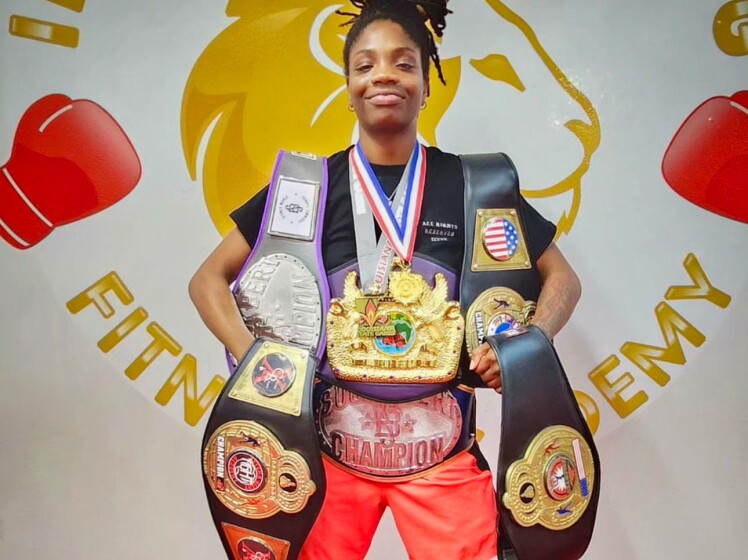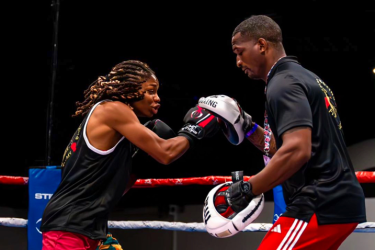In the world of amateur boxing, where even a single punch can turn the tide of a match, Akira Hailey stands out not only for her fierce determination and skillful technique but also for her keen understanding of an often-overlooked aspect of training: sleep. As she sets her sights on the prestigious USA Boxing National Open, with high hopes of making the cut for the USA Boxing team and one day competing on an Olympic stage, Hailey credits sleep as one of the most important factors in the leadup to this tournament.
Sleep is not just a break from the rigors of her intense training schedule; it's a critical component of a successful elite athlete’s regimen, enhancing the ability to train, speeding up recovery, and sharpening focus in the moment. For Hailey, in a sport that demands peak physical and mental performance, her approach to sleep underscores its vital role in preparing her to face off with the best in the country. After all, Hailey doesn’t just appreciate sleep, she’s a Mattress Firm Sleep Expert®. In this role, she’s received 200 hours of specialized training in sleep science and techniques, allowing her to tailor sleep solutions that cater not just to athletes but to anyone looking to enhance their sleep quality. It’s a vocation she takes great passion in, saying, “I help customers get the great sleep they need.”
Hailing from Louisiana, Akira Hailey is a former collegiate basketball player turned boxer. After an injury put her basketball career on hold, she decided to step into the ring in 2020—and she’s been fighting her way to the top ever since. Already a six-time national champion, Hailey had an impressive showing at the 2023 USA Women’s Championship, and now she’s focused on the National Open, which could see her reach new milestones in her boxing career as she looks to turn pro later this year.
Her road to the National Open isn’t easy. Hailey’s training schedule requires laser focus and dedication, necessitating five to six hours of daily training, which includes running, various strength and conditioning exercises as well as time in the boxing ring, usually at Innovative Boxing Fitness Academy, the gym she boxes out of. But none of that is possible without a good night’s rest, which might be her key to success. As a sleep expert, “[my job] has allowed me to learn more about sleep, how many hours I'm supposed to be getting, and how much support I need within the mattress,” says Hailey. “On top of that, working at Mattress Firm allows me as an athlete to make the right adjustments in my sleep patterns to be refreshed.”

How Sleep Unlocks Peak Performance
In recent years, there has been ample research on the importance of sleep and its role in athletic performance, cognition, and mental health, so much so that even the International Olympic Committee (IOC) has acknowledged its significance. For athletes like Hailey, quality sleep is essential for quick thinking, mood regulation, and stress reduction, leading to better focus, decision-making, and resilience. Based on a study of professional mixed martial arts (MMA) athletes during a six-week fight camp period, the athletes who showed consistency in sleep demonstrated superior performance and missed significantly fewer sessions due to fatigue. While good sleep maximizes training gains and makes for better all-around prowess, sleep deprivation is a good predictor for injuries, and has been associated with longer reaction times and reduced force, cognitive slowing, memory impairment, and decreased vigilance.
“Boxing is 90% mental and 10% physical,” said Hailey, who credits sleep with sharpening her mental agility and improving her decision-making and focus during bouts. “I have to be well rested to be able to retain even half the information I’m learning. Boxing comes with a lot of different tactics and strategies that you want to work on. It’s a game of, ‘Who’s the faster thinker?’ So the more sleep you get, the better your brain works.”
The Recovery Power of Sleep
Not only is sleep important for restoring the energy required to train and perform, it’s also crucial for recovery, says Melanie Clark, an athlete injury and recovery specialist with bēon IV and Med Spa and former boxing gym manager who has been working with Hailey since she first got into the sport. “Sleeping isn’t just for brain function; it’s also for muscle function,” says Clark. Sleep promotes the release of growth hormone, essential for muscle repair and growth. It’s also been shown to help regulate the body’s inflammatory responses, leading to faster recovery times and reduced risk of injury. “One of the biggest rules we have with Akira is to get enough sleep. If she’s not getting the right amount of sleep in the days leading up to a fight, she will feel exhausted and worn out before she even steps into the ring.”
Hailey credits her on-the-job training as a Sleep Expert with teaching her that “sleep is the most important thing. Without it I cannot recover properly,” she says.
To boost recovery and achieve deeper and more restorative sleep, Hailey and her team also utilize a Haelo machine, which uses Pulsed Electromagnetic Field (PEMF) therapy to enhance cellular function, improve circulation, and treat musculoskeletal chronic pain. “The Haelo has different settings, and one of those is to help relax her muscles and any tension she has within her muscles [and] her tendons to help her get a better rest at night,” says Clark.

Inside a Top Boxer’s Sleep Routine
Despite growing evidence on sleep’s role in athletic success, many athletes aren’t good sleepers. Sleep disorders and sleep concerns are particularly prevalent among elite athletes, and compared to non-athletes, they tend to sleep less on average, and their quality of sleep
appears to be lower than their non-athlete peers, especially the night before a competition, despite concrete studies pointing to the benefits of rest for performance. Even knowing how important sleep is, getting a good night’s rest isn’t as easy as just closing your eyes and drifting off. Fortunately, for Hailey, she has a dialed-in sleep routine.
“My sleep schedule really changed when I became a boxer,” says Hailey. “I used to get [by with] an hour or two of sleep, or a quick couple of naps in between classes or practices and be good. But with boxing, I cannot do that.” Now, she sticks to a strict schedule that would earn commendations from her fellow Sleep Experts.
She takes a shower after a long training day, has her last meal by 7 p.m., then rids herself of any phone distractions. “My phone goes into sleep mode at 8:45 p.m.; that’s my wind-down time,” she says. She’ll read, or if it’s during fight camp, she’ll study boxing film to learn from the greats. “I watch them and study their moves to see if I can put it into my arsenal.”
“Normally, I go to sleep at 9:30[p.m.], and I wake up at 7[a.m.],” says Hailey, giving her just shy of 10 hours of sleep, which she credits for helping her stay ahead of the competition. “The first couple hours of that sleep is just exhaustion sleep. I’m enormously tired from all of the training I do. By getting enough sleep, I’m able to go back and run those six miles, and do four hours of heavy bag training without feeling the tension in my [body].”
She also keeps her room at the optimal temperature for restorative sleep—a cool 67 degrees Fahrenheit, within what Dr. Valerie Cacho, a board-certified sleep medicine specialist, calls the “zone of comfort.” A cooler sleeping environment can help lower body temperature, which is conducive to entering and maintaining deep sleep phases (which is probably why polar explorers get such a good night’s rest). Additionally, cooler temperatures are associated with increased production of melatonin, the hormone that plays a crucial role in sleep quality.
Like most boxers will attest, the night before a big match can be the hardest to get a good night’s rest because the adrenaline is pumping and their mind races as they strategize for their match. “It’s really hard for me to go to sleep the night before [a fight],” says Hailey, but it’s more important than ever that she find a way to calm her mind and sleep. In a tournament like the one coming up, she’ll be fighting back-to-back for the duration of the competition. This is where her discipline routine kicks in, allowing her to settle her nerves and fall asleep on time. “A good,
well-rested sleep, like 10 hours, helps me be ready for the next day, the next day, and the next day.”
Hailey's holistic approach to her boxing training and focus on incorporating effective sleep strategies has set her firmly on the path to boxing gold. By prioritizing rest, Hailey ensures that her body and mind are in peak condition, giving her the competitive edge she needs to achieve her dreams (which are unsurprisingly 90% about boxing). As she advances towards the U.S. National Open, it's clear that her commitment to well-rounded preparation, where quality sleep is a key component, could very well be the deciding factor in her quest for the top spot in the boxing world.
Her advice for aspiring boxers: “Get as much sleep as you can, so when you do get that time to shine, you can show the world what you're made of.”










